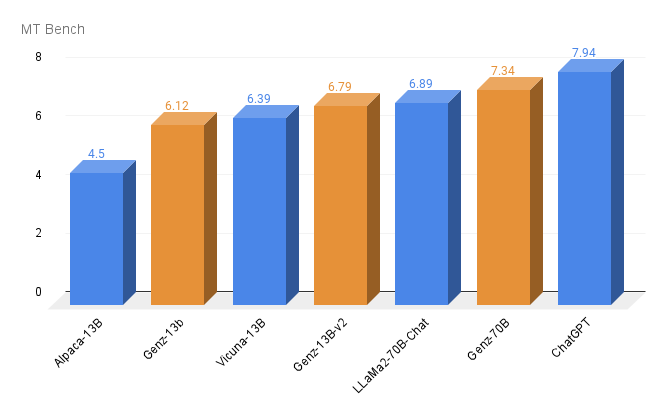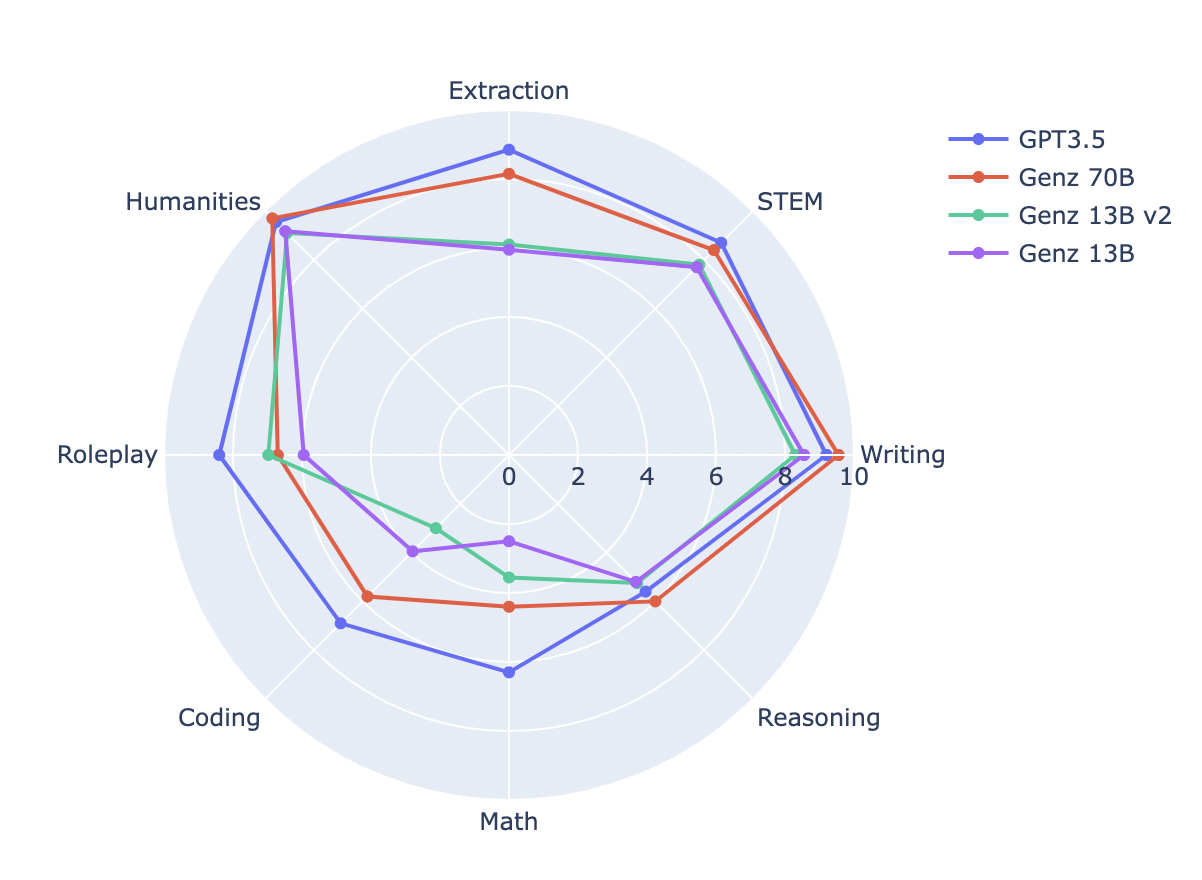
TheBloke's LLM work is generously supported by a grant from andreessen horowitz (a16z)
GenZ 70B - AWQ
Description
This repo contains AWQ model files for Bud's GenZ 70B.
About AWQ
AWQ is an efficient, accurate and blazing-fast low-bit weight quantization method, currently supporting 4-bit quantization. Compared to GPTQ, it offers faster Transformers-based inference.
It is also now supported by continuous batching server vLLM, allowing use of AWQ models for high-throughput concurrent inference in multi-user server scenarios. Note that, at the time of writing, overall throughput is still lower than running vLLM with unquantised models, however using AWQ enables using much smaller GPUs which can lead to easier deployment and overall cost savings. For example, a 70B model can be run on 1 x 48GB GPU instead of 2 x 80GB.
Repositories available
- AWQ model(s) for GPU inference.
- GPTQ models for GPU inference, with multiple quantisation parameter options.
- 2, 3, 4, 5, 6 and 8-bit GGUF models for CPU+GPU inference
- Bud's original unquantised fp16 model in pytorch format, for GPU inference and for further conversions
Prompt template: User-Assistant-Newlines
### User:
{prompt}
### Assistant:
Provided files and AWQ parameters
For my first release of AWQ models, I am releasing 128g models only. I will consider adding 32g as well if there is interest, and once I have done perplexity and evaluation comparisons, but at this time 32g models are still not fully tested with AutoAWQ and vLLM.
Models are released as sharded safetensors files.
Serving this model from vLLM
Documentation on installing and using vLLM can be found here.
- When using vLLM as a server, pass the
--quantization awqparameter, for example:
python3 python -m vllm.entrypoints.api_server --model TheBloke/Genz-70b-AWQ --quantization awq
When using vLLM from Python code, pass the quantization=awq parameter, for example:
from vllm import LLM, SamplingParams
prompts = [
"Hello, my name is",
"The president of the United States is",
"The capital of France is",
"The future of AI is",
]
sampling_params = SamplingParams(temperature=0.8, top_p=0.95)
llm = LLM(model="TheBloke/Genz-70b-AWQ", quantization="awq")
outputs = llm.generate(prompts, sampling_params)
# Print the outputs.
for output in outputs:
prompt = output.prompt
generated_text = output.outputs[0].text
print(f"Prompt: {prompt!r}, Generated text: {generated_text!r}")
How to use this AWQ model from Python code
Install the necessary packages
Requires: AutoAWQ 0.0.2 or later
pip3 install autoawq
If you have problems installing AutoAWQ using the pre-built wheels, install it from source instead:
pip3 uninstall -y autoawq
git clone https://github.com/casper-hansen/AutoAWQ
cd AutoAWQ
pip3 install .
You can then try the following example code
from awq import AutoAWQForCausalLM
from transformers import AutoTokenizer
model_name_or_path = "TheBloke/Genz-70b-AWQ"
# Load model
model = AutoAWQForCausalLM.from_quantized(model_name_or_path, fuse_layers=True,
trust_remote_code=False, safetensors=True)
tokenizer = AutoTokenizer.from_pretrained(model_name_or_path, trust_remote_code=False)
prompt = "Tell me about AI"
prompt_template=f'''### User:
{prompt}
### Assistant:
'''
print("\n\n*** Generate:")
tokens = tokenizer(
prompt_template,
return_tensors='pt'
).input_ids.cuda()
# Generate output
generation_output = model.generate(
tokens,
do_sample=True,
temperature=0.7,
top_p=0.95,
top_k=40,
max_new_tokens=512
)
print("Output: ", tokenizer.decode(generation_output[0]))
# Inference can also be done using transformers' pipeline
from transformers import pipeline
print("*** Pipeline:")
pipe = pipeline(
"text-generation",
model=model,
tokenizer=tokenizer,
max_new_tokens=512,
do_sample=True,
temperature=0.7,
top_p=0.95,
top_k=40,
repetition_penalty=1.1
)
print(pipe(prompt_template)[0]['generated_text'])
Compatibility
The files provided are tested to work with AutoAWQ, and vLLM.
Huggingface Text Generation Inference (TGI) is not yet compatible with AWQ, but a PR is open which should bring support soon: TGI PR #781.
Discord
For further support, and discussions on these models and AI in general, join us at:
Thanks, and how to contribute
Thanks to the chirper.ai team!
Thanks to Clay from gpus.llm-utils.org!
I've had a lot of people ask if they can contribute. I enjoy providing models and helping people, and would love to be able to spend even more time doing it, as well as expanding into new projects like fine tuning/training.
If you're able and willing to contribute it will be most gratefully received and will help me to keep providing more models, and to start work on new AI projects.
Donaters will get priority support on any and all AI/LLM/model questions and requests, access to a private Discord room, plus other benefits.
- Patreon: https://patreon.com/TheBlokeAI
- Ko-Fi: https://ko-fi.com/TheBlokeAI
Special thanks to: Aemon Algiz.
Patreon special mentions: Alicia Loh, Stephen Murray, K, Ajan Kanaga, RoA, Magnesian, Deo Leter, Olakabola, Eugene Pentland, zynix, Deep Realms, Raymond Fosdick, Elijah Stavena, Iucharbius, Erik Bjäreholt, Luis Javier Navarrete Lozano, Nicholas, theTransient, John Detwiler, alfie_i, knownsqashed, Mano Prime, Willem Michiel, Enrico Ros, LangChain4j, OG, Michael Dempsey, Pierre Kircher, Pedro Madruga, James Bentley, Thomas Belote, Luke @flexchar, Leonard Tan, Johann-Peter Hartmann, Illia Dulskyi, Fen Risland, Chadd, S_X, Jeff Scroggin, Ken Nordquist, Sean Connelly, Artur Olbinski, Swaroop Kallakuri, Jack West, Ai Maven, David Ziegler, Russ Johnson, transmissions 11, John Villwock, Alps Aficionado, Clay Pascal, Viktor Bowallius, Subspace Studios, Rainer Wilmers, Trenton Dambrowitz, vamX, Michael Levine, 준교 김, Brandon Frisco, Kalila, Trailburnt, Randy H, Talal Aujan, Nathan Dryer, Vadim, 阿明, ReadyPlayerEmma, Tiffany J. Kim, George Stoitzev, Spencer Kim, Jerry Meng, Gabriel Tamborski, Cory Kujawski, Jeffrey Morgan, Spiking Neurons AB, Edmond Seymore, Alexandros Triantafyllidis, Lone Striker, Cap'n Zoog, Nikolai Manek, danny, ya boyyy, Derek Yates, usrbinkat, Mandus, TL, Nathan LeClaire, subjectnull, Imad Khwaja, webtim, Raven Klaugh, Asp the Wyvern, Gabriel Puliatti, Caitlyn Gatomon, Joseph William Delisle, Jonathan Leane, Luke Pendergrass, SuperWojo, Sebastain Graf, Will Dee, Fred von Graf, Andrey, Dan Guido, Daniel P. Andersen, Nitin Borwankar, Elle, Vitor Caleffi, biorpg, jjj, NimbleBox.ai, Pieter, Matthew Berman, terasurfer, Michael Davis, Alex, Stanislav Ovsiannikov
Thank you to all my generous patrons and donaters!
And thank you again to a16z for their generous grant.
Original model card: Bud's GenZ 70B
~ GenZ ~

Democratizing access to LLMs for the open-source community.
Let's advance AI, together.
Introduction 🎉
Welcome to GenZ, an advanced Large Language Model (LLM) fine-tuned on the foundation of Meta's open-source Llama V2 70B parameter model. At Bud Ecosystem, we believe in the power of open-source collaboration to drive the advancement of technology at an accelerated pace. Our vision is to democratize access to fine-tuned LLMs, and to that end, we will be releasing a series of models across different parameter counts (7B, 13B, and 70B) and quantizations (32-bit and 4-bit) for the open-source community to use, enhance, and build upon.

The smaller quantization version of our models makes them more accessible, enabling their use even on personal computers. This opens up a world of possibilities for developers, researchers, and enthusiasts to experiment with these models and contribute to the collective advancement of language model technology.
GenZ isn't just a powerful text generator—it's a sophisticated AI assistant, capable of understanding and responding to user prompts with high-quality responses. We've taken the robust capabilities of Llama V2 and fine-tuned them to offer a more user-focused experience. Whether you're seeking informative responses or engaging interactions, GenZ is designed to deliver.
And this isn't the end. It's just the beginning of a journey towards creating more advanced, more efficient, and more accessible language models. We invite you to join us on this exciting journey. 🚀
Milestone Releases ️🏁
[21 August 2023] GenZ-70B : We're excited to announce the release of our Genz 70BB model. Experience the advancements by downloading the model from HuggingFace.
[27 July 2023] GenZ-13B V2 (ggml) : Announcing our GenZ-13B v2 with ggml. This variant of GenZ can run inferencing using only CPU and without the need of GPU. Download the model from HuggingFace.
[27 July 2023] GenZ-13B V2 (4-bit) : Announcing our GenZ-13B v2 with 4-bit quantisation. Enabling inferencing with much lesser GPU memory than the 32-bit variant. Download the model from HuggingFace.
[26 July 2023] GenZ-13B V2 : We're excited to announce the release of our Genz 13B v2 model, a step forward with improved evaluation results compared to v1. Experience the advancements by downloading the model from HuggingFace.
[20 July 2023] GenZ-13B : We marked an important milestone with the release of the Genz 13B model. The journey began here, and you can partake in it by downloading the model from Hugging Face.
Evaluations 🎯
Evaluating our model is a key part of our fine-tuning process. It helps us understand how our model is performing and how it stacks up against other models. Here's a look at some of the key evaluations for GenZ 70B:
Benchmark Comparison
We've compared GenZ models to understand the improvements our fine-tuning has achieved.
| Model Name | MT Bench | MMLU | Human Eval | BBH |
|---|---|---|---|---|
| Genz 13B | 6.12 | 53.62 | 17.68 | 37.76 |
| Genz 13B v2 | 6.79 | 53.68 | 21.95 | 38.1 |
| Genz 70B | 7.33 | 70.32 | 37.8 | 54.69 |
MT Bench Score
A key evaluation metric we use is the MT Bench score. This score provides a comprehensive assessment of our model's performance across a range of tasks.

Getting Started on Hugging Face 🤗
Getting up and running with our models on Hugging Face is a breeze. Follow these steps:
1️⃣ : Import necessary modules
Start by importing the necessary modules from the ‘transformers’ library and ‘torch’.
import torch
from transformers import AutoTokenizer, AutoModelForCausalLM
tokenizer = AutoTokenizer.from_pretrained("budecosystem/genz-70b", trust_remote_code=True)
model = AutoModelForCausalLM.from_pretrained("budecosystem/genz-70b", torch_dtype=torch.bfloat16, rope_scaling={"type": "dynamic", "factor": 2})
prompt = "### User:\nWrite a python flask code for login management\n\n### Assistant:\n"
inputs = tokenizer(prompt, return_tensors="pt")
sample = model.generate(**inputs, max_length=128)
print(tokenizer.decode(sample[0]))
Want to interact with the model in a more intuitive way? We have a Gradio interface set up for that. Head over to our GitHub page, clone the repository, and run the ‘generate.py’ script to try it out. Happy experimenting! 😄
Why Use GenZ? 💡
You might be wondering, "Why should I choose GenZ over a pretrained model?" The answer lies in the extra mile we've gone to fine-tune our models.
While pretrained models are undeniably powerful, GenZ brings something extra to the table. We've fine-tuned it with curated datasets, which means it has additional skills and capabilities beyond what a pretrained model can offer. Whether you need it for a simple task or a complex project, GenZ is up for the challenge.
What's more, we are committed to continuously enhancing GenZ. We believe in the power of constant learning and improvement. That's why we'll be regularly fine-tuning our models with various curated datasets to make them even better. Our goal is to reach the state of the art and beyond - and we're committed to staying the course until we get there.
But don't just take our word for it. We've provided detailed evaluations and performance details in a later section, so you can see the difference for yourself.
Choose GenZ and join us on this journey. Together, we can push the boundaries of what's possible with large language models.
Model Card for GenZ 70B 📄
Here's a quick overview of everything you need to know about GenZ 70B.
Model Details:
- Developed by: Bud Ecosystem
- Base pretrained model type: Llama V2 70B
- Model Architecture: GenZ 70B, fine-tuned on Llama V2 70B, is an auto-regressive language model that employs an optimized transformer architecture. The fine-tuning process for GenZ 70B leveraged Supervised Fine-Tuning (SFT)
- License: The model is available for commercial use under a custom commercial license. For more information, please visit: Meta AI Model and Library Downloads
Intended Use 💼
When we created GenZ 70B, we had a clear vision of how it could be used to push the boundaries of what's possible with large language models. We also understand the importance of using such models responsibly. Here's a brief overview of the intended and out-of-scope uses for GenZ 70B.
Direct Use
GenZ 70B is designed to be a powerful tool for research on large language models. It's also an excellent foundation for further specialization and fine-tuning for specific use cases, such as:
- Text summarization
- Text generation
- Chatbot creation
- And much more!
Out-of-Scope Use 🚩
While GenZ 70B is versatile, there are certain uses that are out of scope:
- Production use without adequate assessment of risks and mitigation
- Any use cases which may be considered irresponsible or harmful
- Use in any manner that violates applicable laws or regulations, including trade compliance laws
- Use in any other way that is prohibited by the Acceptable Use Policy and Licensing Agreement for Llama 2
Remember, GenZ 70B, like any large language model, is trained on a large-scale corpora representative of the web, and therefore, may carry the stereotypes and biases commonly encountered online.
Recommendations 🧠
We recommend users of GenZ 70B to consider fine-tuning it for the specific set of tasks of interest. Appropriate precautions and guardrails should be taken for any production use. Using GenZ 70B responsibly is key to unlocking its full potential while maintaining a safe and respectful environment.
Training Details 📚
When fine-tuning GenZ 70B, we took a meticulous approach to ensure we were building on the solid base of the pretrained Llama V2 70B model in the most effective way. Here's a look at the key details of our training process:
Fine-Tuning Training Data
For the fine-tuning process, we used a carefully curated mix of datasets. These included data from OpenAssistant, an instruction fine-tuning dataset, and Thought Source for the Chain Of Thought (CoT) approach. This diverse mix of data sources helped us enhance the model's capabilities across a range of tasks.
Hyperparameters
Here are the hyperparameters we used for fine-tuning:
| Hyperparameter | Value |
|---|---|
| Warmup Ratio | 0.04 |
| Learning Rate Scheduler Type | Cosine |
| Learning Rate | 2e-5 |
| Number of Training Epochs | 3 |
| Per Device Training Batch Size | 4 |
| Gradient Accumulation Steps | 4 |
| Precision | FP16 |
| Optimizer | AdamW |
Looking Ahead 👀
We're excited about the journey ahead with GenZ. We're committed to continuously improving and enhancing our models, and we're excited to see what the open-source community will build with them. We believe in the power of collaboration, and we can't wait to see what we can achieve together.
Remember, we're just getting started. This is just the beginning of a journey that we believe will revolutionize the world of large language models. We invite you to join us on this exciting journey. Together, we can push the boundaries of what's possible with AI. 🚀
Check the GitHub for the code -> GenZ
- Downloads last month
- 14
Model tree for TheBloke/Genz-70b-AWQ
Base model
budecosystem/genz-70b